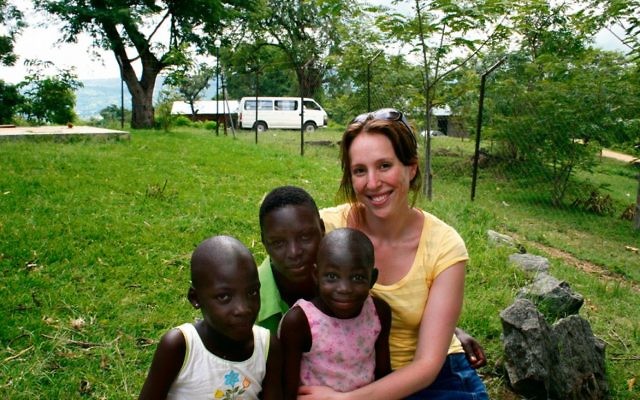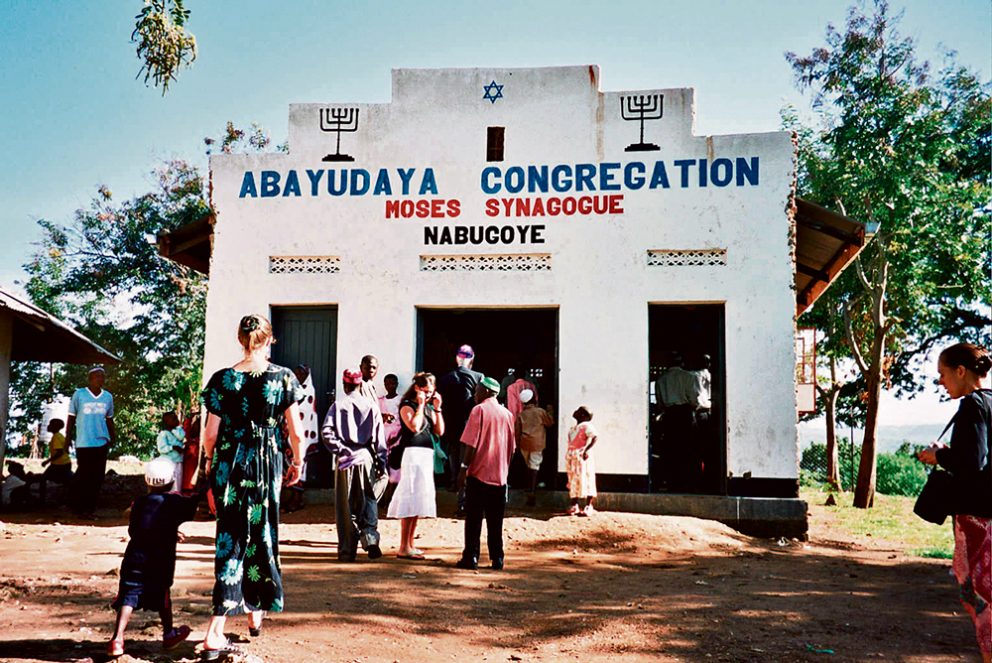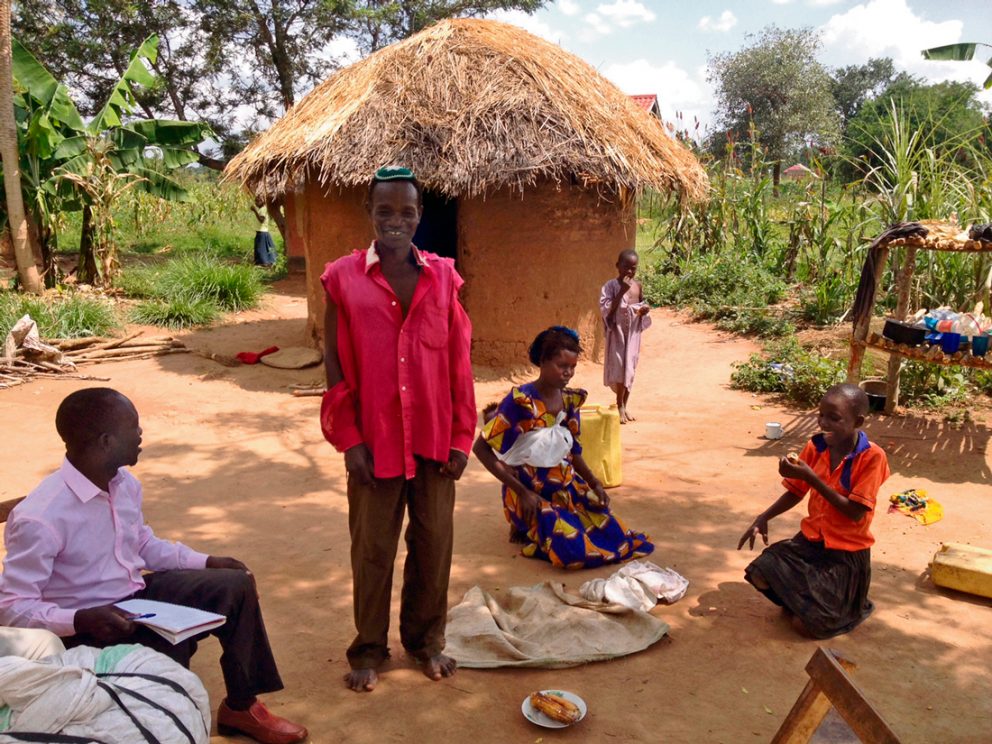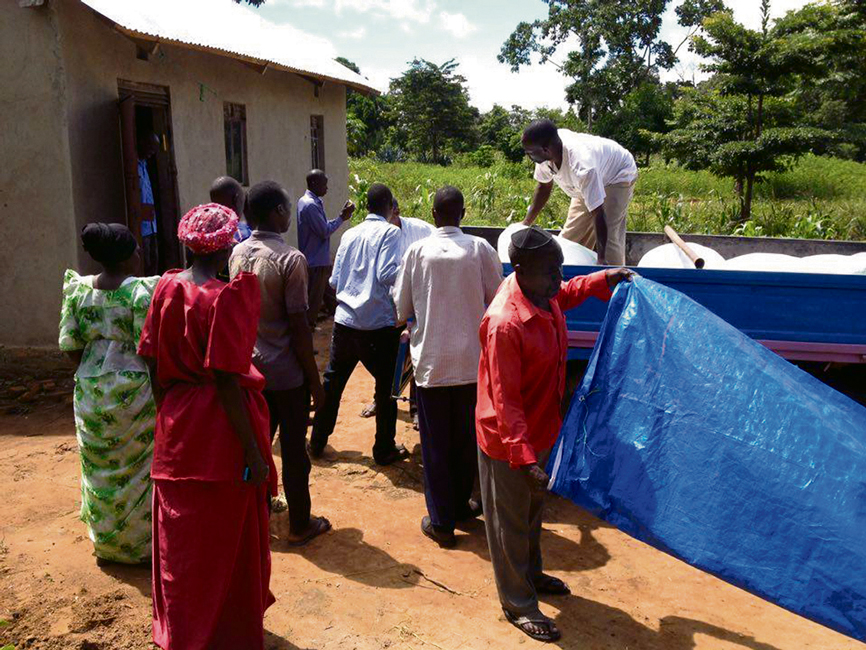Out of Africa
When Zara Sarzin had an encounter with the Jewish Abayudaya community of Uganda more than 10 years ago, little did she know that it would be the beginning of a special relationship that would literally save lives.
When Zara Sarzin had an encounter with the Jewish Abayudaya community of Uganda more than 10 years ago, little did she know that it would be the beginning of a special relationship that would literally save lives. Rebecca Davis reports.
In 2006, Zara Sarzin worked at the World Bank and was posted in Uganda. As Pesach approached, Sarzin, originally from Sydney, was eager to locate a Seder to join. She looked for a community of ex-pat Jews or Israelis with whom she could spend the chag. She googled, and this is when she first discovered the Abayudaya – Uganda’s Jews.
The Abayudaya are an impoverished community of approximately 2000 African Jews living in five villages near Mbale, a rural part of Eastern Uganda near the Kenyan border. They owe their origins to celebrated military leader Semei Kakungalu.
In the 1880s, Kakungalu was converted to Christianity by British missionaries. As time passed and conflict ensued between Kakungalu and the British, he would learn about Judaism, and proclaim himself a Jew. In subsequent years, the community would undertake formal conversions and finally the Jewish Agency would recognise the Abayudaya.
Sarzin celebrated a Passover in the village of Nabugoye that she would never forget.
“When Idi Amin was forced into exile in 1979, it was on the eve of Pesach,” she explains.
The dictator Amin had ruled Uganda since 1971. During this time, the practice of Judaism was forbidden, and synagogues were destroyed.
“So, when we sat down in the community to celebrate Passover, it had a completely different meaning for them, and for me.
“They thought that they had also been freed in their generation. There was so much about their story that was familiar, and yet so much that was different.”
Captivated by the Abayudaya people and their commitment to their Judaism, Sarzin visited the community a further five times – even capturing the experience on camera for a documentary that she created.
The final edit depicts a community where Judaism is at its epicentre. Children are seen reciting the Shema, and girls sit alongside boys who wear brightly coloured woven kippot as they happily participate in Hebrew classes. We follow a woman’s kosher preparations for a meal, and even see the mikvah. Community members speak to the camera, sharing their hopes, and special relationship to their Jewishness.
Israel Siriri is an Abayudaya leader. Sarzin fondly remembers staying with Siriri, his wife and children – and their chickens that slept under her bed.
“My dream is I pray that my children study, that they get the formal knowledge, and the education, and that they get Jewish married. That will be good for me. I will not feel comfortable if my children marry a non-Jew,” says Siriri.
The connection to tradition is fervent, despite being a part of a diverse broader community.
Differing cultural and religious groups in the region generally live alongside each other in harmony, with Muslims and Christians choosing to send their children to the same Jewish schools as the Abayudaya.
There is also a strong sense of community and shared responsibility. In a subsequent visit, Sarzin was hosted by a single mother.
“When it came to dinner time, the house was suddenly full. She had five children, but at dinner time there were other children coming in the house that she would feed. There was never a question about helping other people in the community,” Sarzin remembers.
The generosity of the Abayudaya people stands as a stark contrast to the hardships that they face.
“We certainly saw the extent of the poverty in the country, but I think it is quite different when you are in someone’s home and you see on a day-to-day basis how they live,” reflects Sarzin, sharing that while staying with the family, one of the children fell ill with malaria.
The fragility of the situation experienced by the Abayudaya was further underscored when the agriculturally-dependent community suffered the effects of a serious drought that began in 2016. Put simply, when drought hits, there is no food, “and they fall deeper and deeper into poverty”, tells Sarzin. “They start selling everything they have, they take up loans, and the children are removed from schools. Sometimes they don’t go back.”
Sarzin, who now lives in Melbourne, learnt of the peril faced by the drought-stricken Abayudaya community last year. Some people were at the point of selling land, the impacts of which are crippling and long-lasting. Others were literally starving to death.
Siriri shares the account of a Muslim family whose grandmother would go without food while the children cried all day, begging and scratching her for something to eat.
Sarzin acted, launching an online fundraiser.
“Zara is an angel of help to our suffering members,” says Siriri.
The initial aim was to raise $12,000 to enable the purchase of food for the 42 Abayudaya families in the Namutumba district as well as the 35 Muslim and Christian families that live amongst them.
Thankfully, the Australian Jewish community answered Sarzin’s call for help. More than $17,500 was raised – exceeding the original goal by $5500. Donations were received from individuals, families and student-organised fundraisers at Leibler Yavneh College in Melbourne and Emanuel School in Sydney, and Zionist youth group Netzer. Every cent of the money raised was sent directly to the Abayudaya community, who kept meticulous handwritten records documenting the quantities of the staple food, posho (corn flour) distributed to each family.
“The Australian people are so loving and kind to help people they have never visited nor seen,” says a grateful Siriri.
Sarzin is thrilled with the result of the fundraiser. The support meant that the people of Namutumba were sustained through-out the drought, the funds even extending to the nearby community of Aparc.
“They were able to harvest their crops successfully and the families are no longer suffering from acute hunger, selling farm animals, taking children out of school, or reducing the number of meals they eat,” she explains.
However, the reality is that these exceptionally poor communities remain reliant on traditional, inefficient farming methods, and are vulnerable to further droughts.
“Our dream is improve food productivity, food security through storing some food during harvest in a central storage facility so when such times come we can help our people,” says Siriri.
Sarzin shares that they are also now working together on a three-year project that will provide families with improved seeds which have been adapted to survive harsher climatic conditions, producing higher crop yields; shared oxen and ploughs to allow them to cultivate larger areas and increase their agricultural production; and farmer training to build skills and use improved technologies, manage climate shocks and store, process and market crops for sale.
And she is resolute in making it happen.
“Implemented together, these activities would make systemic and sustainable change in the community – providing lasting food security for 500 people and empowering the community to become self-reliant.”
To learn more about the project, or to contribute, email namutumbaproject@gmail.com
An Abayudaya story
Abayudaya community leader, Israel Siriri, shares the story of a family touched by the drought.
“This is a Jewish family (pictured). They say food came to them when they had sold their cows and were planning to sell land. He says he has children at school and famine had taken all the money which was for school fees. It is a blessing to him for a person whom he has never seen to provide food, helping him. He says he has land but needs empowerment so he can cultivate larger gardens … He send his love to the people who did this great miracle.”
In their own words
The Namutumba Abayudaya community penned a heartfelt letter of thanks.
“We, the community members of Namutumba Jewish synagogue and on the behalf of our neighbouring non- Jewish members hereby send in much appreciation to all our esteemed donors for the famine attention by distributing food to us.
In fact this program has rescued
the lives of Namutumba community both Jewish and non-Jewish because people had even started dying of hunger and also famine had affected so many sectors such as pupils were not attending schools hence affecting education sector negatively.
Many people had sold all whatever they had such as cattle, goats and so many other things that could be sold for food but could not be enough still.
For this note therefore, we thank all people who got involved in this program and not forgetting Mr Israel Siriri for having such good coordination between the donors and our community.
We therefore ask the Almighty God to enable you to go on with that spirit of having ‘an open hand’ that helps the needy.”







comments